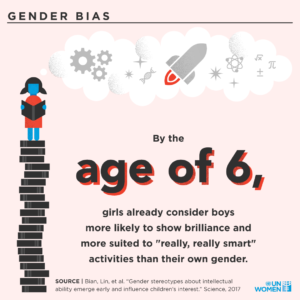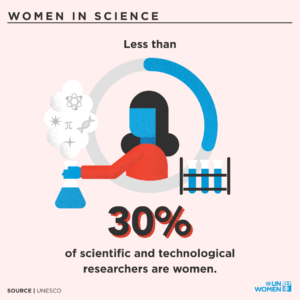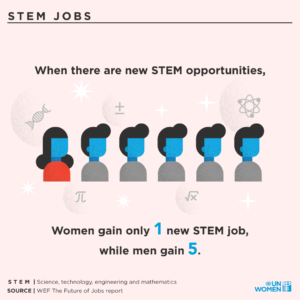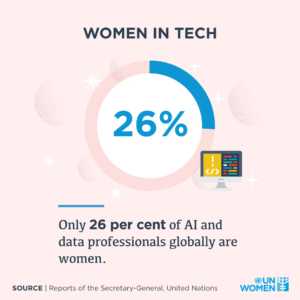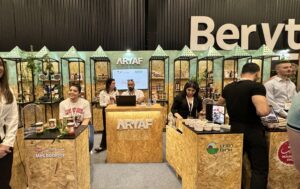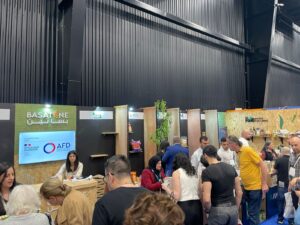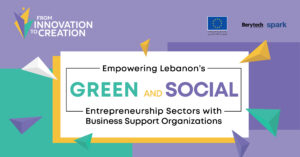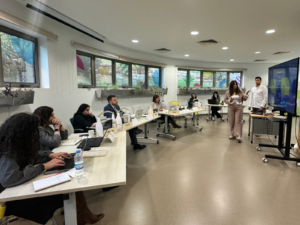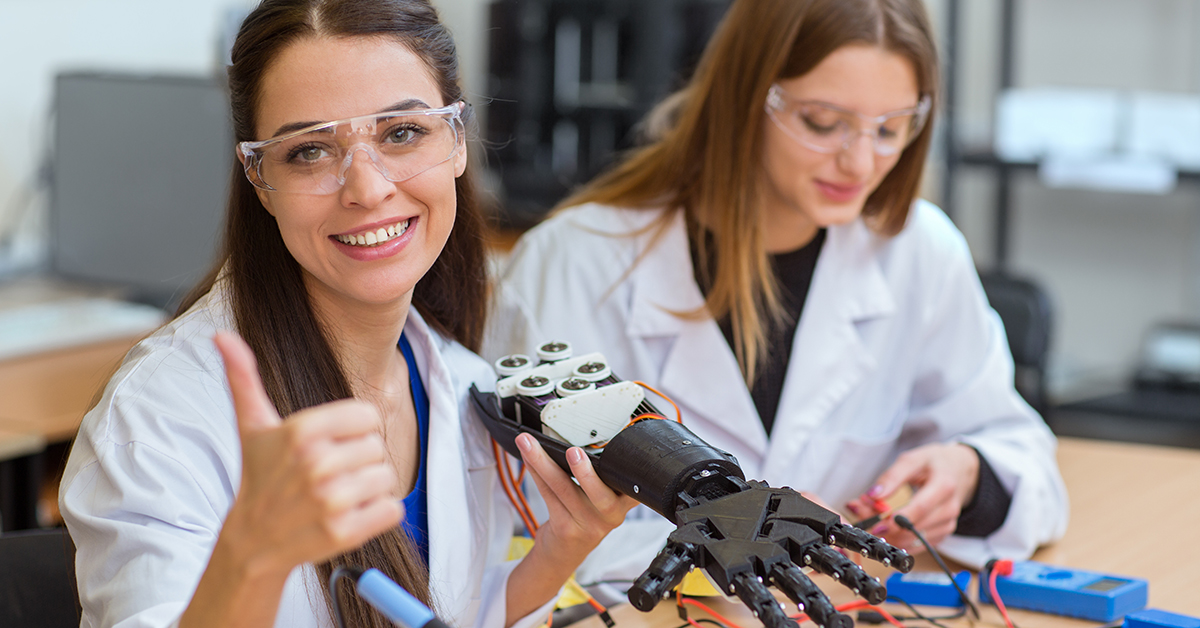
February 11 has been adopted by the UN as the International Day of Women and Girls in Science, as long-standing biases and gender stereotypes are steering girls and women away from science related fields.
Science and gender equality are both vital for the achievement of the internationally agreed development goals that Berytech is committed to.
We are keen on providing equal opportunities and support to all women in their entrepreneurial journey. While we believe that women should naturally be equally involved in our community, we reinforce that by setting a female quota for all our programs and by partnering with programs and competitions specifically designed for women.
Meet our Lebanese Women in Science
For this international day, we reached out to women in our Berytech community working, innovating and teaching Science, Technology, Engineering and Math (STEM) to hear more about their experiences and expectations.
Kristina Farah is the co-founder of Quadra Machinery, a complete provider of agricultural machinery and products in the MENA, offering a wide range of machines for complete lines in fruit sorting, treatment, sorting, packaging, and more.
Joelle Bechara is the founder of Cranium Education, an educational platform that exposes young people to STEAM activities using Science, Technology, Engineering, Art, and Mathematics as access points in guiding inquiry, dialogue, and critical thinking through fun learning experiences.
Rana Chemaitelly is the founder of the Little Engineer, an award-winning initiative and a unique platform that invests in young minds to unleash their full potential in Science, Technology, Engineering and Math.
Nisrine el Turky is the Co-founder of IoTree, a smart wireless network of smart traps that are developed using a deep learning algorithm and machine vision designed for the early detection, classification, and counting of different types of harmful pests.
Grace Harb is the Program Director of Initiation to ICT and Tech for Girls and Marginalized Youth at the Lebanese League for Women in Business. The ‘Girls Got IT’ program has for a main goal to empower young girls and bridge the gender gap in technology, by promoting digital literacy and introducing the young girls to existing careers in STEM.
STEAM: Challenges, Misconceptions & Motivation
Q: What are the challenges that face women innovating in STEM?
Kristina: The main challenge is in the day-to-day tasks. For instance, building Quadra’s apple sorting machine prototype involved dealing with workers, technicians, or hardware store tellers who automatically assume that I am not competent enough because of my gender. As an example, a hardware store teller would say “this item is too professional for an arts and crafts project” or “where is your father and are you sure he told you to buy this”. This is where I would have to convince them that I am actually an engineer and that I am building a machine, “so please just let me buy the item I came for and leave.” Another scenario is when I would ask a technician to do a specific task, yet he does something completely different assuming I do not know what I am doing because of my gender.
Nisrine: Before taking the entrepreneurial journey, I studied in an engineering school, and became a professor in computer and communication engineering. In academia and industry, many times the voice of a woman is not always taken seriously despite how many innovative ideas she has or how much she can achieve. She needs to be persistent to believe in herself despite people ignoring her. For example, her thoughts about amendments that need to occur in engineering programs, or her opinion as a whole might be dismissed. Meanwhile, opinions of male engineers are never taken with a grain of salt, their achievements are never belittled, and they are always seen as a badge of honor. My company lies on the intersection of technology and agriculture, both male-dominated sectors. Here, many times, customers and investors do not take a businesswoman or a CEO very seriously.
Grace: Women in STEM have been fighting for so long the negative stereotyping and their rights for equal opportunities to study and work; research and studies were conducted on the major challenges faced by women in STEAM fields, and the majority had the same results: 1- gender bias and discrimination, 2- the difficulty of finding life-work balance, and 3- lack of support and awareness.
According to UNESCO, only 35% of STEM students in higher education globally are women, and differences are observed within STEM disciplines. Graduate women attempting to pursue a career or postgraduate degrees are often excluded based on their gender and marginalized therefore much less apt to enter and remain in the job, few achieve leadership positions. In principle, there are equal opportunities for both genders in the many Arab States, but social perception and prejudice determine which types of employment are particularly suitable for women or men.
Q: What are the misconceptions that people have of women in STEM?
Joelle: There are still many people who view careers in science or technology as more masculine. They think that women and girls are just not interested in STEM activities and careers. There is also a general misconception that men are more competent in math and science.
Grace: The biggest misconception to date is that women are not interested in STEM and no women are working and have achieved a breakthrough in these fields. Another big misconception is that women are more inclined to “girlish” occupations (caregiving occupations). We, at Girls Got It, have been channeling our efforts to fight those misconceptions, sharing with our students the achievements and inventions done by women, like the discovery of the first basis of Wi-Fi and Bluetooth done by Hedy Lamar, the invention of Kevlar, or on a national level, the achievement of our Lebanese students who won the international Innovation award or Dr. Saliba who won the Laureate of Women in Science. We believe that highlighting women’s achievements in the STEM world is the essence to fight against the cultural stigma.
Kristina: The most common misconception that I hear is that women’s logic is not as good as men’s, which is why it is “surprising” to find a woman in science. I have been told many times “you will struggle to try to keep up in this field”. However, I strongly believe that there has been a major improvement in gender equality when it comes to women in universities, startup competitions, and similar places where women would be surrounded by highly educated people. For example, my experience with Berytech, while we were enrolled in the Agrytech Program, as a woman was very smooth and encouraging, thanks to the high level of education that everyone around me had.
Nisrine: Unfortunately, even in 2021, some people still think that men are more intelligent than women who still suffer from bias on many levels. A man who has a family is seen as a strong key element for a company (because he needs to work hard to put food on the table), while a married woman who has kids is seen as a loss for the company because she is not seen as fully committed to work. Companies should assess people and leaders based on their qualifications, what they have achieved in life, and what they are promising to deliver.
Q: How do you think the ecosystem can better support women in STEM?
Grace: The support is needed on 2 different levels: for girls at a young age and for career women. Young girls need exposure and encouragement to take part in special STEM programs (at affordable prices) to discover and learn the importance of STEM. Women in STEM need recognition and support to find their life-work balance which will lead to an equal opportunity to reach leadership positions. They also need an anti-harassment environment. Lebanon has great resources and talents, and it is not difficult to nurture a female-friendly STEM environment and expand our boundaries. The ecosystem can help create a learning and motivating environment by sharing resources and experiences and creating equal opportunities.
Kristina: In the startup ecosystem, and in my personal opinion, some activities that aim to encourage women, such as competitions that have a “woman entrepreneur” theme, actually reinforce gender inequality by making it seem like women belong in a separate category. I believe that simply continuing to treat women and men as equals is more than enough to give a woman a chance in STEM, without overdoing it. To me, gender inequality is a big topic that is directly linked to the cultural traditions of our parents and grandparents and is much more complex to deal with.
Rana: We have to empower young girls and inspire them about the STEM fields and try our best to engage them as role models. Try to impose a quota in recruiting for STEM fields. I believe quota is a good initiator for the change.
Nisrine: Successful women need to be highlighted more in the mainstream media so they showcase to the young generation what women can do. Fellowships, grants and scholarships should try to close the gap between women and men in science by encouraging women to be good at math, coding and science. Indeed, a lot of effort is needed from different entities, but eventually, we can eliminate the sexist bias and let women lead and shine in all the fields whether it is the STEM world, the corporate world, or anything a woman strives for.
Q: What are the difficulties that you face in teaching STEM to young girls?
Joelle: The majority of parents think that interest in robotics is reserved for boys. Parents often underestimate the scientific abilities of their girls. This damages a girl’s confidence. They tend to choose more artistic activities for their girls and don’t even give them the chance to be exposed to STEM fields.
Rana: To me, engaging girls in STEM activities is an art and not a challenge. I adore teaching young girls especially if they have a passion for STEM, the more they are responsive the more I give them. However, when I meet a girl who is not interested in the STEM field, I try to change her mind set about how scary the field is by introducing her to our platform.
Grace: Through our experience at Girls Got It and during all our workshops, the common difficulty faced was to fight the misperception of the subject matter, the lack of self-confidence and mostly the influence of parents on girl-students that STEM is for boys and that they are not equipped for these studies/fields. On a different level, the major difficulty was the lack of resources. A recent study by UNICEF shows that girls in low and middle-income economies are particularly disadvantaged in developing digital skills, therefore these difficulties affect their future education choices.
Berytech on Women Empowerment
Berytech has dedicated a track of activities to support women entrepreneurs in overcoming the constraints they face to thrive in entrepreneurship and in maximizing their potential contributions to the Lebanese economy. Within this track, Berytech aims to motivate women to launch, grow and succeed in their own ventures by creating customized programs, competitions and tracks and identifying successful role models, as well as influence policies towards the support of women entrepreneurs.
“It is crucial today to support women in their quest to break that glass ceiling, particularly in the STEM sectors,” comments Reina Dib Angoujard, Director of Communications and Outreach at Berytech. “Young girls need to be inspired by women role models innovating in science, technology, engineering and mathematics, as this ultimately leads to more diversification in those sectors, and better solutions for our global challenges. Promoting gender equality is a priority at Berytech and this is reflected in our programs, activities and services. We have seen and continue to witness the tremendous intelligence and creativity of women entrepreneurs in our ecosystem, and it is our duty to make sure that the world knows and hears about their success stories.”
Berytech is commitment to Sustainable Development Goal 9 and has pledged to build resilient infrastructure, promote inclusive and sustainable industrialization and foster innovation. On this International Day of Women and Girls in Science, join Berytech in celebrating women and girls, who are leading innovation and call for actions to remove all barriers that hold them back. Join the conversation with #WomenInScience!


